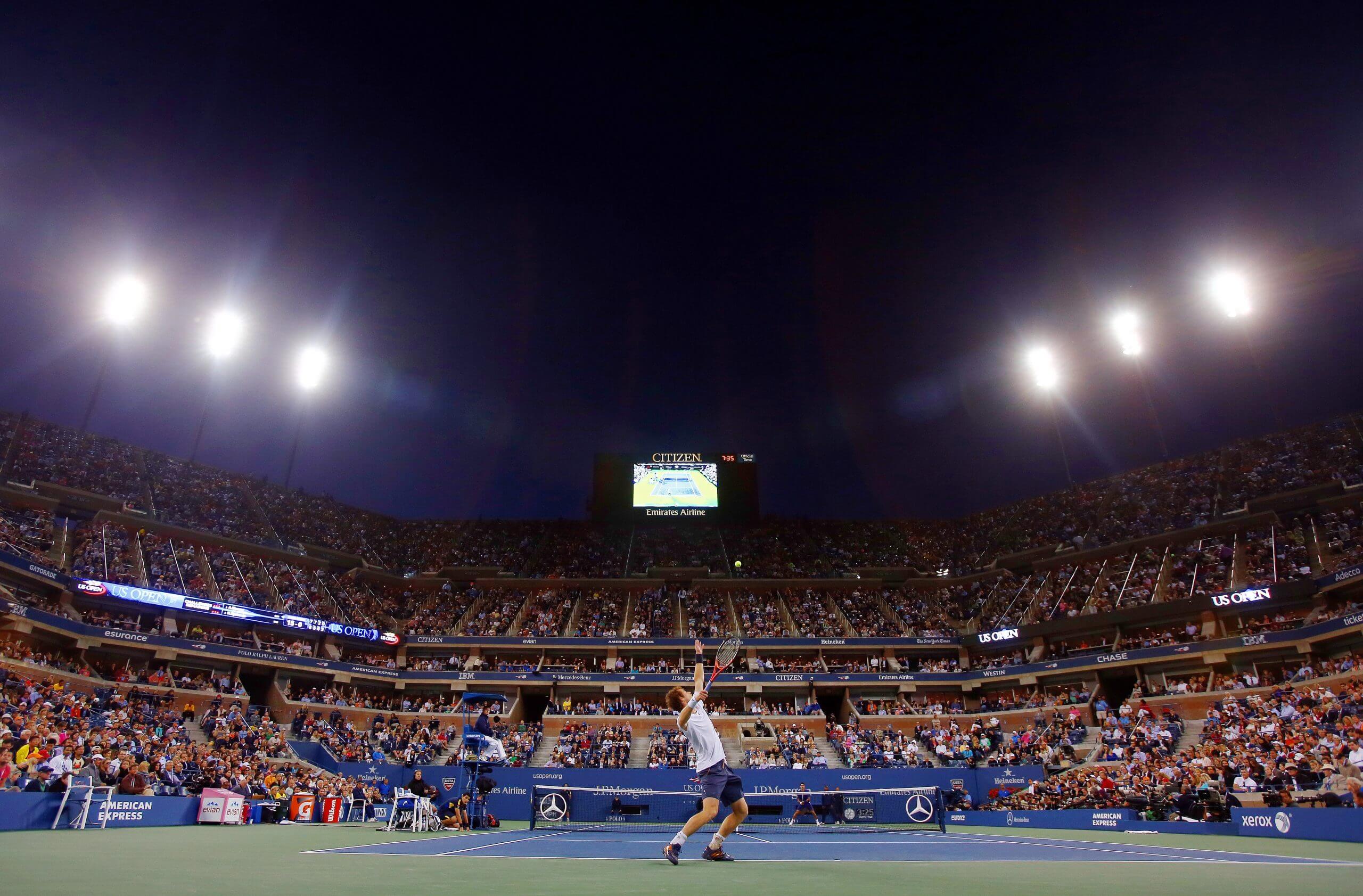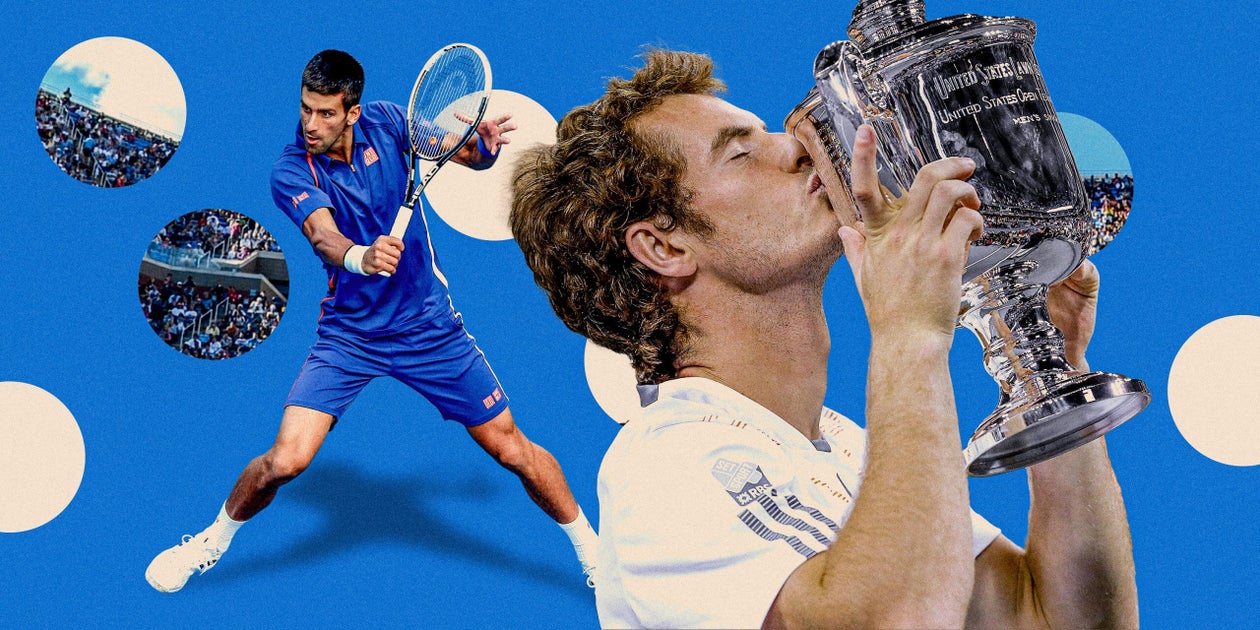The Athletic has live coverage of the U.S. Open men’s final featuring Jannik Sinner vs. Carlos Alcaraz
This article is part of our New York Court Classics series, a special feature produced by The Athletic looking back at classic U.S. Open performances, iconic athletes and timeless moments.
FLUSHING, N.Y. — The 2012 U.S. Open men’s final between Novak Djokovic and Andy Murray was strange and consequential.
Murray ended his country’s 76-year wait for a male Grand Slam champion by winning the joint longest final in tournament history. It was played in the gusty, swirling aftermath of a tornado that had ripped through Queens, forcing the match to be played on a Monday instead of a Sunday.
When it was over, Murray lifted his first major title after losing his first four Grand Slam finals. The match was so up and down that it was not clear which way it might go until the very end, typified by a 54-shot rally played in a hostile wind that had defined both players’ matches en route to the final. During Murray’s semifinal against Czech player Tomáš Berdych, the wind blew a chair onto the court during one point and blew Murray’s cap off his head during another; Djokovic’s semifinal against David Ferrer of Spain was abandoned because of a tornado warning. It did not resume until the second Sunday of the tournament, pushing the final back to Monday.
“It never happened to me or I don’t think to any other player before,” Djokovic said of the tornado warning in a news conference at this year’s U.S. Open.
“I just remember that year was super, super windy and difficult just to play overall for anyone.”
The rivalry between Murray and Djokovic defined the atmosphere as much as the wind did. Born a week apart, they first played each other when they were 11. In September 2012, they were both 25. Djokovic was the world No. 1 and had five majors to his name; Murray was the world No. 4 and had won one set in his four Grand Slam finals, one of which had been a straight-sets thrashing by Djokovic.
Murray’s closeness was becoming a national obsession, as Great Britain hoped desperately for a first male Grand Slam champion since Fred Perry in 1936. As the U.S. Open rolled around, memories of Murray’s closest defeat to date were fresh in the nation’s mind. After losing in the final to Roger Federer, he had won many hearts and minds with an emotional post-match speech. Some of the British public still perceived Murray as dour and moody, but more and more were swept up in this compelling story of a tennis mortal doing everything in his power to get past the three demigods of Federer, Rafael Nadal and Djokovic.
Murray had injected some self-belief just ahead of New York by beating Federer on Wimbledon’s Centre Court in the 2012 Olympic final, but his rivalry with Djokovic was deeper than winning his first major.
Brad Gilbert, who coached Andre Agassi, Andy Roddick and Coco Gauff to U.S. Open titles and worked with the Scot in 2006, remembers Murray being clear about his man to beat.
“I asked him about all these players, and he would just kind of look at me,” Gilbert said in a phone interview this week. “When I brought up Djokovic, he said, ‘Nothing else matters. That’s the guy.’ And that even included Federer and Nadal, who were already there.”
By 2012, Murray’s coach was Ivan Lendl. Like Murray, Lendl lost his first four Grand Slam finals, and his no-nonsense style suited the discerning, sometimes contrarian Murray. Ahead of his Australian Open semifinal against Djokovic that January, Lendl told Murray: “You’ll win, but you’re going to have to go through a lot of pain to get there, so be ready for that.”
Murray actually lost a close-to-five-hour marathon 7-5 in the fifth set, but Lendl’s prediction uncannily summed up the U.S. Open final that Murray won eight months later. “A lot of pain” still doesn’t come close to how excruciating the 7-6(10), 7-5, 2-6, 3-6, 6-2 victory over Djokovic would be.
Despite Lendl and the Olympic win, Murray’s major record left him questioning himself going into the final. “I was still doubting myself right up to a few minutes before going on to play the match,” he said in his post-match news conference.
“You’re thinking, ‘Are you going to be able to do this?’ … The matches against him are always going to hurt. It’s something I have never done before. I have been in this position many times and not managed to get through. So there are a lot of things you’re thinking about before you go out on the court.”
Murray, who was not available for interview for this story, told a few reporters in 2022: “I remember being in the locker room on my own and feeling unbelievably nervous and feeling pretty lonely and kind of feeling a lot of pressure.”
Others were more optimistic. “It’s funny, I really just felt like he was going to win,” said Annabel Croft, the former British No. 1 who was covering the match for Sky Sports, in an interview last week.
Something did feel a little different about this final in the early stages. Murray settled quickly, breaking in the first game, but then Djokovic immediately broke him back. It was time to strap in: Murray’s matches tended to be nerve-shredders, and it already felt like this one was heading that way, even as Murray mostly matched the world No. 1 shot for shot, playing out a 54-shot rally in the sixth game.
Given the wind, the level of tennis was extraordinary. Murray and Djokovic were at the vanguard of tennis in 2012, which at that point was a game of crafty baseline attrition and relentless testing of each other’s groundstrokes. As the match wore on, and the players’ physicality started to fray, there were more cat-and-mouse points in the front of the court, featuring drop shots, rushes to the net and increasingly absurd angles.
Such a set ended as it was always destined to do: with a 24-minute tiebreak, longer than the legendary John McEnroe vs. Björn Borg one from the 1980 Wimbledon final, but with 22 points played compared with 34. The scoreline was 12-10 in Murray’s favor, as he won a succession of 30-shot baseline rallies and converted his sixth set point. His roar of “come on” was so loud it might have been heard in Manhattan.
In a flash of clairvoyance, one-time Murray coach Mark Petchey said on air that it was “unthinkable we will have to watch another four sets of this,” and the second was similarly dramatic. Murray went 4-0 up before being reeled back to 5-5, but he stole two games in a row to take a two-set lead. As throughout his career, 24-time Grand Slam champion Djokovic was struggling with the wind.
“Two sides of the court with two different conditions,” he said in a news conference afterward. “Playing down the wind and against the wind is a huge advantage or disadvantage.
“We had to make a lot of improvisation. We had to try to stay in there and stay focused and be in balance, and the wind was doing everything to keep us out of balance.”
A straight-sets win felt too good to be true, for Murray and for the British public watching at home where midnight was approaching. Djokovic duly rebounded to take the next two sets.
Jonathan Overend had been the BBC’s tennis correspondent since 2003. He had been there for every Murray near miss and now found himself commentating for the nation on what looked set to be the most painful of them all. “Broadcasting from somewhere back to the U.K., you’re always working in British time,” he said in an interview this week.
“So we’re at around 1:30 a.m. when Djokovic levels the match. At that point, I’m getting so many messages saying, ‘Right, turning off now, speak in the morning, what a shame for Murray, five sets Djokovic.’ There was just a feeling of inevitability.”
Murray suspects that had he not left the court for a bathroom break before the fifth set, he would have lost. He took himself to a cubicle near the players’ entrance to Arthur Ashe Stadium. “It is small, not much more than a toilet, a sink and a mirror. I was thinking: ‘Why do I keep losing these finals? Do I lack something? How on earth did I squander a two-set lead?’” Murray told The Times of London in 2013.

Andy Murray’s 2012 U.S. Open final against Novak Djokovic is the joint longest in tournament history. (Elsa / Getty Images)
“So I started talking. Out loud. ‘You are not losing this match,’ I said to myself. ‘You are not losing this match.’ I started out a little tentative, but my voice got louder. ‘You are not going to let this one slip. This is your time.’”
Murray broke immediately at the start of the fifth set, which both players said was crucial afterwards, and then broke again for 3-0. He lost one of the breaks but got it back to be in a position to serve for the match up 5-2. Djokovic called the trainer for cramps, adding to the drama and suspense of it. After a delay in which he spent practising serves, Murray had three championship points at 40-0, and when Djokovic sent a forehand long on the second, he was a Grand Slam champion at last. He had done it the hard way, finally putting away a player as durable as a tennis Terminator.
It was such an emotional victory that even some reporters were said to be crying in the press seats. “That was the time when my voice cracked — that one, not Wimbledon the following year,” Overend said.
“I will always remember 2012 for the final game. We’re right at the top of the Arthur Ashe Stadium, so behind the back row of spectators. Every spectator that I could see got up to their feet. The match is still going, but they know he’s going to do it. I remember saying on the radio, ‘Well, they might as well stay standing because he’s going to do this.’”
“The most unique thing about Andy is he had this amazing ability to win matches,” Gilbert said. “And you looked at the stats, like, ‘How’s he doing it?’ He knew how to win. That’s a very underrated quality.”
Murray, dazed in the immediate aftermath of the victory, faffed around trying to find a sponsor’s watch in his bag. He was congratulated by Sean Connery and Sir Alex Ferguson, who had gate-crashed his news conference a couple of days earlier.
“I’m thinking a lot just now,” he said in the one after the win. “I’m thinking a lot about a lot of different things. It’s hard to explain. It’s been a long, long journey. I don’t know if it’s disbelief or whatever. I’m very, very happy on the inside; I’m sorry if I’m not showing it as you would like.”
Overend, waiting to interview Murray, saw Lendl — famously unexpressive — give his player a quick hug before disappearing, seemingly into the night. Overend called out his congratulations to the departing coach, who called back: “It wasn’t me, it was him.”
(Illustration: Demetrius Robinson / The Athletic / Darron Cummings, Cameron Spencer, Stan Honda / Getty Images;
The New York Court Classics series is presented by Ralph Lauren.
The Athletic maintains full editorial independence. Partners have no control over or input into the reporting or editing process and do not review stories before publication.

